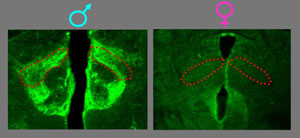
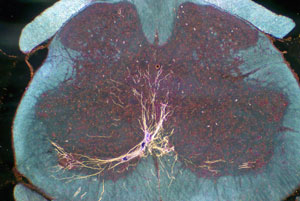

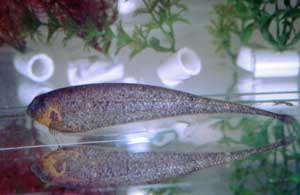
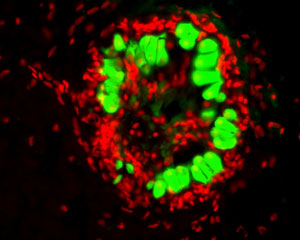

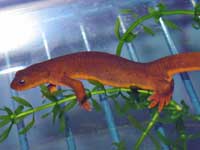
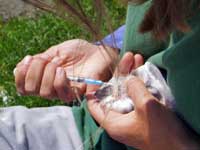
CTRD Themes
Recent literature and popular news stories reveal strong scientific and popular interest in the reproductive behavior of humans and other animals, including the myriad environmental influences on reproductive development. An overriding objective of this training program is to enhance understanding of the genesis and relevance of sex and gender.
History has shown that important insights into the basic mechanisms of reproduction and development can be gained by study of non-human model systems, as well as evolutionarily diverse non-model systems. The Program’s title, “Common Themes in Reproductive Diversity” is intended to focus attention on the universal challenge all animals must meet, to reproduce and provide for offspring, while also addressing the myriad ways in which animals accomplish these ends. Training focuses on three areas.
- Parental Effects on Development
- Roles of Hormones in the Development and Maintenance of Sex-specific Reproductive Physiology and Behavior
- Disease, Immunity, and Reproductive Function
Parental Effects on Development
Mothers and fathers affect offspring development in countless ways, many non-genetic. For example, maternal diet during egg production is known to affect offspring sex ratio, body size, and attractiveness to the opposite sex, and maternal exposure to disease allows the transmission of protective antibodies to young.
Several program faculty are devoted to research on parental effects.
- Moczek explores the molecular, genetic, and ecological determinants of sex-specific horn formation by young dung beetles.
- Alberts dissects the impact of the maternal environment on the behavior of rat pups.
- Heiman studies the role of oxytocin in post-partum depression in humans.
- Ketterson studies effects of steroid hormones and immunoglobulins deposited by mothers in egg yolk on the growth, disease resistance, and offspring sex ratio in songbirds, as well as the impact of male parental behavior on offspring begging and growth.
- Sengelaub focuses on the role of maternal licking in neural development and stress resistance in the rat.
- Sanders studies the effects of drug exposure on the in utero hormonal milieu and the subsequent development of adult sexual and non-sexual behaviors in humans.
- From a unifying evolutionary perspective, Wade has developed a theory relating direct and indirect (parental) effects to the evolutionary process, e.g., how the evolution of a female turtle’s preference for a nest site is affected by temperature-dependent nest influences on the sex ratio of her offspring.
Roles of Hormones in the Development and Maintenance of Sex-specific Reproductive Physiology and Behavior
Across species, including humans, many of the behaviors, morphologies, and physiological processes that are essential for reproduction are sexually dimorphic. Studies of model and non-traditional organisms provide important insights into the shared mechanisms by which hormones guide sexual differentiation and/or influence adult reproductive physiology and behavior.
Expertise among program faculty runs from the molecular to the evolutionary.
- Cherbas, Moczek, and Rosvall study the genomics of hormone actions during development.
- Goodson, Rosvall, Smith and Sengelaub address how hormones affect cellular physiology and anatomy so as to induce sexually dimorphic physiology and behavior at the level of the organism.
- Demas, Goodson, Heiman, Ketterson, Novotny, Sanders, Sengelaub, Suthers, Smith, and Vitzthum study the roles of hormones in mediating developmental and adult plasticity in fertility and reproductive behavior, including that of humans.
- Goodson, Ketterson, Martins, Moczek, Suthers, Smith, and Wade employ a comparative approach to the evolution of hormone-mediated sexual dimorphism.
Collectively, the systems, techniques, and perspectives offered by these diverse scientists provide students a unique opportunity to explore common themes in the role of hormones in accounting for reproductive diversity.
Disease, Immunity, and Reproductive Function
Sexual physiology and behavior are linked in a wide variety of intriguing ways with the transmission of diseases and parasites and an organism's ability to cope with disease and illness. Sexual behavior is a major mode of disease transmission in humans as well as other animals, and sexually and non-sexually transmitted diseases and parasites play a critical role in the evolution and maintenance of sexual reproduction in natural populations.
The program’s faculty includes leading experts in the relationships among disease, parasitism, immunity, and sexual reproduction.
- Lively studies the role of disease and parasitism in the evolution and maintenance of sexual reproduction.
- Demas and Ketterson study tradeoffs between the immune system's ability to fight disease and reproductive physiology.
- Wade studies how disease resistance evolves in structured populations.
- Sanders and Heiman add expertise in human reproduction and the epidemiology of sexually transmitted diseases.
 ©2024 The Trustees of
©2024 The Trustees of